
The comarques of Catalonia, often referred to in English as counties, are an administrative division of Catalonia. Each comarca comprises a number of municipalities, roughly equivalent to a county in the United States. Currently, Catalonia is divided into 42 comarques and Aran, considered a "unique territorial entity" and not a comarca.

The Socialists' Party of Catalonia is a social-democratic political party in Catalonia, Spain, resulting from the merger of three parties: the Socialist Party of Catalonia–Regrouping, led by Josep Pallach i Carolà, the Socialist Party of Catalonia–Congress, and the Catalan Federation of the PSOE. It is the Catalan instance of the Spanish Socialist Workers' Party (PSOE), and its Aranese section is Unity of Aran. The party had also been allied with federalist and republican political platform Citizens for Change until the 2010 election. PSC–PSOE has its power base in the Barcelona metropolitan area and the comarques of Tarragonès, Montsià, and Val d'Aran.
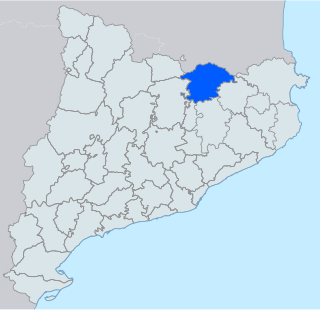
Ripollès is a comarca (county) in the Girona region, Catalonia, Spain. It is located in the Ribes and Camprodon river valleys. In 2001, its population was 25,744, about 40% of whom lived in the capital, Ripoll.

The Republican Youth is a left-wing political party, and also the youth wing of the Republican Left of Catalonia, a Catalan pro-independence party. Until April 2018 it was known as Young Republican Left of Catalonia..

A vegueria, plural vegueries, is one of eight regional divisions of Catalonia, following the regional plan of Catalonia. Each vegueria is further divided into comarques and municipalities, with the exception of the Aran Valley, considered a "unique territorial entity".
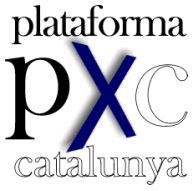
Platform for Catalonia was a far-right political party rooted in Catalonia, Spain, which centred its political agenda around controlling immigration and was opposed to Catalan independence. It was strongly anti-Islamic and was widely considered a racist, xenophobic political force. Its leader was Josep Anglada, town councillor in Vic.
The Free Catalan Territory are those declared municipalities or regions of Catalonia that had approved a motion in a plenary session by the councillors of the town or the region council, as they represent the municipality's local authority. Such motions declare that Spanish laws and regulations are considered provisional, waiting for the Government and Parliament of Catalonia to enact new Catalan laws after having assumed national sovereignty, and therefore turning Catalonia into an independent state.
The Democratic Pact for Catalonia was a Catalan electoral alliance established in May 1977 ahead of the Spanish Congress of Deputies 15 June election. It ran on a political platform emphasizing the need of approving a statute of autonomy for Catalonia. The coalition comprised members from two separate, previously established alliances: Democratic Convergence of Catalonia (CDC) and Democratic Left of Catalonia (EDC) from the Democratic Front for Catalonia, and the Socialist Party of Catalonia–Regrouping (PSC–R) and the National Front of Catalonia (FNC) from the Left Front.

The Volem acollir protest was a protest march in Barcelona that took place on 18 February 2017. The purpose of the march was to demand more openness towards refugees and a more active role of the European Union in the European migrant crisis. They planned for it to be the largest protest in Europe and they achieved the goal. The size of the march was estimated at 160,000 by police and 500,000 by organisers.

Jordi Cuixart i Navarro is a Spanish businessman and cultural activist from Catalonia. He was the president of Òmnium Cultural, a non-profit cultural organisation founded in 1961 with more than 190,000 members and 52 local branches in Catalonia, from December 2015 to February 2022.

Joaquim Torra i Pla, known as Quim Torra, is a Catalan lawyer and journalist from Spain. He served as President of the Government of Catalonia from 17 May 2018 to 28 September 2020, when the Supreme Court of Spain confirmed a court ruling by the High Court of Justice of Catalonia condemning him for disobeying the Central Electoral Board during the April 2019 general election, leading to his disqualification from office.

Jordi Puigneró Ferrer is a Catalan IT engineer and politician. He served as Vice President of Spanish Autonomous Community of Catalonia and Minister of Digital Policies and Territory since May 2021 until 29 September 2022. He previously served between 2018 and 2021 as minister of Digital Policies and Public Administration of the Government of Catalonia. He is a member of Together for Catalonia (JUNTS) political party. He is considered the designer and architecture of the Catalan Digital Republic project.

Som Catalans is a xenophobic and independentist party, active in the Spanish autonomous community of Catalonia and founded in 2014 by Ester Gallego and Enric Ravello, following a scission from Platform for Catalonia.
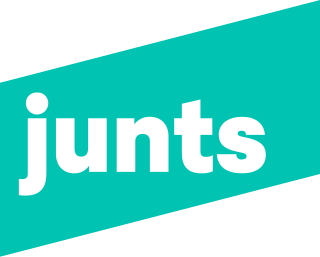
Together for Catalonia, frequently shortened to Junts, is a Catalan nationalist and pro-independence political party that sits on the centre-right of the political spectrum. It is the second-largest party in the Parliament of Catalonia, holding 35 of the 135 seats. The current party president since 2024 is Carles Puigdemont.
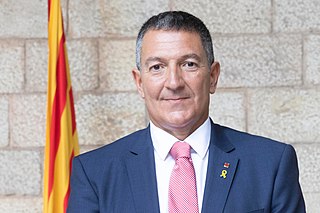
Miquel Sàmper i Rodríguez is a Spanish lawyer and politician from Catalonia and, since 3 September 2020, Minister of the Interior of the Generalitat de Catalunya.
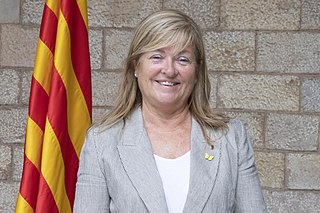
Àngels Ponsa i Roca is a Spanish professor and politician from Catalonia, member of the Parliament of Catalonia in the ninth and tenth legislatures and Minister of Culture of the Government of Catalonia between September 2020 and May 2021.

Montserrat Nebrera González is a Spanish politician and university lecturer.

Gemma Geis i Carreras is a Spanish academic and politician from Catalonia, former member of the regional Parliament of Catalonia and Catalan minister of Research and Universities of Catalonia between 2021 and 2022.
Catalan Alliance is a far-right political party in Catalonia. It is a Catalan pro-independence, and ultranationalist party, that also opposes immigration. It is currently the governing party of the municipality of Ripoll. At the 2024 Catalan regional election, the party entered the Parliament of Catalonia for the first time, with two seats.
Sílvia Orriols i Serra is a Catalan politician from Spain, president of the far-right ultranationalist political party Catalan Alliance, and mayor of Ripoll since June 2023.
















